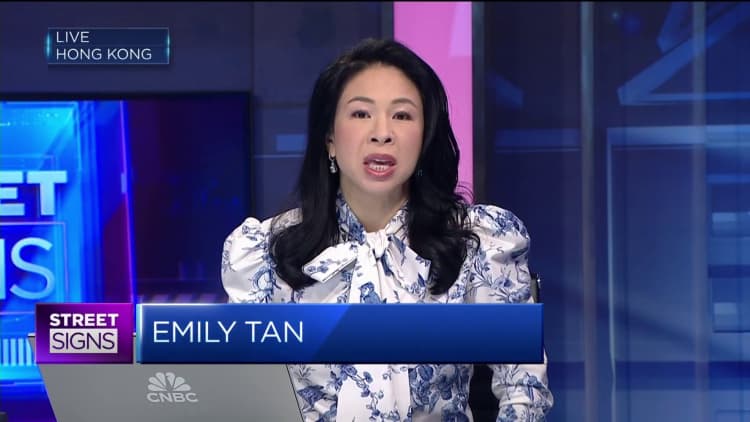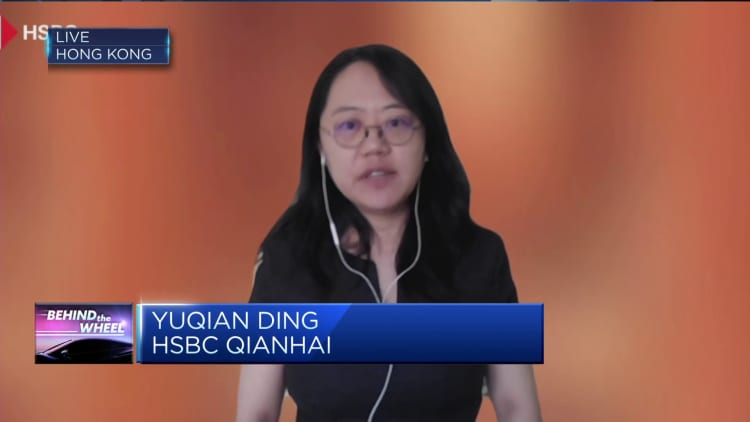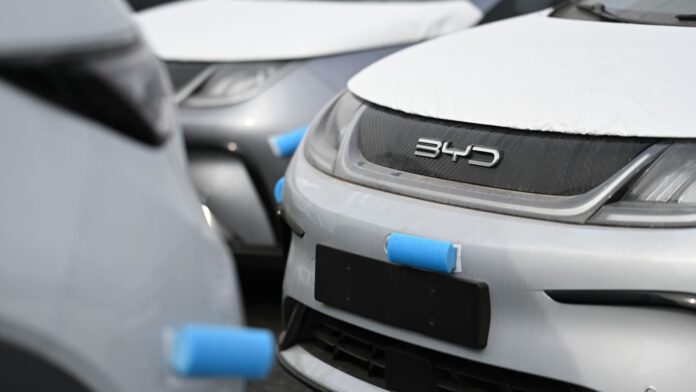New cars of the “Dolphin” model from Chinese car manufacturer BYD are in the harbor.Â
Picture Alliance | Picture Alliance | Getty Images
Chinese electric vehicle makers shares listed in Hong Kong fell on Tuesday as worries of price wars in the sector grew.
China’s EV market, the world’s largest and most crowded, is seeing fierce competition from local players as well as U.S. giants like Tesla to win as much market share as possible through promotions and price cuts.
“While across the board price cuts will put pressure on near-term earnings and margins, this could be offset by a boost in demand as EVs widen their appeal to a broader range of consumers,” Yuqian Ding, head of China auto research at HSBC Qianhai told CNBC.
While consumer interest is improving, the “wait for a better price” sentiment continues to constrain sales volumes for EV makers, Ding said.

At least 30% of China’s entire auto market is made up of electric vehicles, with most of those EVs coming from homegrown brands.
On Tuesday, most Chinese EVs continued to face pressure. Hong Kong-listed shares of Li Auto fell 3.9%, while Nio shares dropped 3.6% and Xpeng was down 1.8%. BYD shares were up 0.4%.
Nio is set to report its December quarter earnings later in the day.
A piece of China’s EV pie
Competition in the country’s EV space has intensified, with local automakers pushing to outsell U.S. rival Tesla with fancy tech and competitive pricing.
Tesla announced new incentives to lure consumers in China on Friday, including discounts in car insurance products, and preferential financing plans for a limited time only.
Despite price cuts announced earlier, Tesla still lost market share in China in January, mainly in the large cities, according to Morgan Stanley.
Li Auto launched a new EV called “Mega” â a multi purpose vehicle priced at 559,800 Chinese yuan ($77,756), and scheduled to start deliveries in March. The minivan comes equipped with a built-in refrigerator and sofa.
Li Auto said last week it delivered 20,251 vehicles in February, up 21.8% from a year ago. However, month-over-month deliveries were down 35% from 31,165 vehicles in January.
Stellantis-backed Leapmotor cut prices of its new EV version of the C10 SUV by nearly 20% compared with presale price, according to the South China Morning Post.
“We have been reiterating that Leapmotor prices its vehicles based on production costs,” SCMP reported, citing Leapmotor’s founder and CEO Zhu Jiangming.
Morgan Stanley research showed that Xpeng and Nio lost share across regions, while BYD saw gains in major cities but losses in less developed areas, where it saw increased competition from state-owned players.
Analysts at the U.S. investment bank said Li Auto’s market share waned in the last quarter of 2023, as investors continue to monitor if there will be a boost from the new model it launched last week.
BYD well positioned
BYD has been lowering prices of various EV models and launched a new version of its best-selling car on Monday.
The company’s Yuan Plus crossover, known overseas as the Atto 3, was priced lower than its discontinued predecessor, according to Reuters.
“BYD has an unparalleled cost structure and product innovation ability, that stems from its high degree of vertical integration and will enable the company to thrive in the ongoing EV race in China and abroad,” Bernstein analysts wrote in a client note.

Bernstein expects China’s EV market to see continued demand growth of about 25% year-on-year while becoming increasingly competitive amid “ongoing pricing pressure.”
In an official statement released at China’s highly anticipated “Two Sessions” meeting on Tuesday, Beijing said its efforts to boost the new energy sector by various measures â including the reduction or exemption of purchase tax for EVs, supporting construction and other infrastructure measures âcontributed to “a 37.9% increase in sales of new energy vehicles in 2023.”
“To ensure smooth logistics flows, we supported an additional 10 cities in serving as national comprehensive freight hubs to shore up operation chains,” according to the document.
Just last week, Chinese President Xi Jinping called for further support for new energy vehicle development, especially by constructing charging infrastructure.
â CNBC’s Evelyn Cheng contributed to this story.


